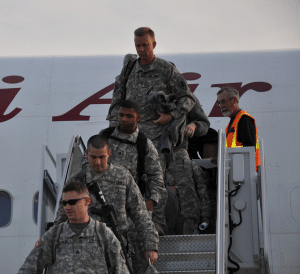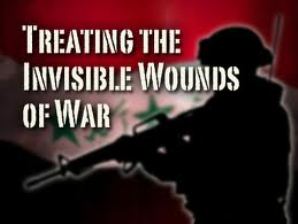by Ed Mattson
I received an email from a veteran last night regarding post traumatic stress disorder (PTSD). Though it didn’t go into much detail, the writer indicated he was motivated to write because he read my article titled, “The road out of PTSD hell” from the first week in September. He said it was a great post and made him realize all was not right in his life and that he hadn’t recognized the symptoms of PTSD.

That’s the problem for many veterans. PTSD seems so natural because it is real. It becomes part of the mind the minute a traumatic experience happens, and in the case of combat, is continually reinforced every time there is a reoccurrence of action. Many do not recognize the sequence of events as being “life-altering”, but everything we experience, both good and bad, can have a lasting affect and most are not aware of how much can change over time. Once the “genie is out of the box”, so to speak, and we begin to realize we are not the same, there should be no hesitation in seeking help. Today, I thought it might be interesting to see some usual and unusual ways to get that help.
There is an informative guide to support through the VA’s National Center for PTSD. Because PTSD can display itself in many forms…anger, the inability to communicate clearly, lost of the feeling of intimacy, confusion, flashbacks, rage and thoughts ranging from wanting to lash-out to suicide, each case needs to be addressed and addressed as quickly as possible. For many who re-experience the trauma of the event(s), the symptoms will, in most cases, only get worse, as feelings of isolation, pity, and ultimately, self-destruction, become real possibilities.
Ironically, the warning signs are noticeable in many cases by those who interact with the veteran, but because anything other than perfect mental health carries such a negative connotation, the veteran may be afraid to acknowledge a problem or may not even recognize it. This is why the branches of the military are today requiring mandatory counseling for active-duty troops upon their return from the combat zone. Additionally, in-country, and in-theater, counseling is available at most combat duty stations. Most unit chaplaincies have received PTSD counseling training and recognize the symptoms.
An interesting note regarding PTSD is that it isn’t just a “warrior experience” for those in the military. Surprisingly, there are instances of the disorder from troops who have never faced combat. You may ask, “how can that happen”; can there be that much trauma experienced from just being in the service? That’s the million dollar question. How else can one explain the rise in suicides among non-combat veterans which is almost as high as for combat-veterans?
As most everyone who has served will tell you, the military experience is like no other. One learns discipline, obedience, regulation, and regimentation. There is a sense of belonging, and in a weird sense, a measure of security not found in the world beyond the duty station.
From the very first day of training one learns to depend on fellow troops and bonds are formed. To those who are not called to serve in combat, many develop feelings that somehow they didn’t really “do their job”, and don’t recognize that to make a cohesive and effective military unit, more troops are often required in a supportive role than as a member of a combat team. The loss of someone with whom they bonded during training or from frequent interaction before being sent off to combat can be like a loss of a family member. No one knows for sure what goes on in the minds of every member of the military, but we are sure of one thing…the compilation of issues each active-duty military member faces in the course of his/her enlistment, can have an accumulative effect leading to situations one would normally not find in civilian life.
Military counseling personnel have studied, dissected, and revisited case after case of issues that lead to PTSD and they have become proficient in providing the help needed for “decompression” for the combat veteran, and the support needed for those who served in supporting roles who may be experiencing a guilt-factor relating to being “left out of the action”. Because each scenario, combat and non-combatant roles differ, each of the military branches are now requesting personnel to attend classes before leaving the military (for the Marine Corps, the classes are required), to not only learn about support on “the outside”, but also to ease the burden of the transition to civilian life itself by understanding what is ahead and how to survive.
Carrying the baggage of PTSD and facing the prospect of seeking employment, assuming the role of parenting in family life, restoring intimacy between spouses, attending school, harboring a physical disability from combat, or even just retiring from the military, can be an up-hill battle for many. One goes from “the security” of the military structure to a hostile economic environment where employment is not insured, compensation may be less, and where there are no certainties other than the need to survive.
The PTSD Support Services homepage recommends making initial contact with one of the many support organizations, even if there is no sign of trouble on the horizon. Missing from the list was the Marine Corps League, but since being in The Corps, just being around other Marines is a feeling like no other. Each of these veterans’ organizations can provide moral support as well as guidance in time of need, and unlike community social service organizations, it is “veterans helping veterans”; and like in combat, we leave no one behind.
Two of the more popular programs where veterans can turn to for assistance are theWounded Warrior Project for those with both physical handicaps and mental challenges, and The National Veterans Foundation which specializes in PTSD counseling, including crisis intervention.
Active duty military and veterans who think they may have PTSD can call the National Veterans Foundation’s (NVF) Lifeline for Vets™ at 888-777-4443, 365 days a year for immediate help..After 6pm EST, for suicide intervention, a veteran can call the National Suicide Prevention Lifeline at 800-273-TALK. For all active-duty and veteran personnel, these phone numbers should be kept handy just in case.
The Wounded Warrior Project has developed a very high profile and gained national support. The National Veterans Foundation, is far from being “well-known”, but important none-the-less. It was founded by Shad Meshad, a former Army Medical Service Officer in the Vietnam War. Shad was one of the pioneers in PTSD treatment. Helping veterans with PTSD remains a core focus of the NVF’s programs and services. Their Lifeline for Vets™ is has saved many lives and is staffed with veterans who understand the unique problems facing military and former military men and women. Both are great assets for veterans in need.
Warrior2Citizen Program
Several months ago I wrote about a new program just underway called Warrior2Citizen. I was asked to be an advisor to this unique and first-of-its-kind program, which is a pilot program involving the State of Georgia, the National Guard, Emory University, Georgia Department of Community Health, Georgia Free Clinic Network, Veterans Innovation Center, VFW Veterans Support Center, and the Georgia Tech Research Institute. It was an offer I couldn’t refuse.
Georgia has a long and proud history of supporting the military both on the battlefield and back home. The state has the fifth largest number of active duty military personnel and the highest population of veterans in the country, so it’s only natural that if you want to perfect a program for veterans, Georgia is the place.
Warrior2Citizen focuses on helping our military men and women re-integrate into life as citizens after serving our country as warriors. I have written about the transition period and what awaits our service members when they leave military duty. The challenge with the economy, finding a job or returning to school, rebuilding a family life and possibly having to deal with a physical disability or post traumatic stress disorder, can become more than an individual can manage without help. It can be absolutely overwhelming. Georgia’s ability to support veterans has been proven effective over the years.
The Veterans Administration reports that nationally, 18 veterans commit suicide EVERY DAY, while another 40 every day will survive a suicide attempt. Georgia is the ONLY state with a record of NO suicides among veterans of wars in Iraq and Afghanistan since 2007, due much in part to programs like the Georgia Regional Triage Model which couples community pastors and counselors with recently returned soldiers in need.
Next week I will present details on the Warrior2Citzen program and how everyone can support the many tried and proven concepts that are being implemented to bring continued success to the Georgia veterans and then how we can take this program “nationally” to help solve the dilemma other states just can’t get a handle on.

Following his service in the Marine Corps Ed Mattson built a diverse career in business in both sales/marketing and management. He is a medical research specialist and published author. His latest book is Down on Main Street: Searching for American Exceptionalism
Ed is currently Development Director of the National Guard Bureau of International Affairs-State Partnership Program, Fundraising Coordinator for the Warrior2Citizen Project, and Managing Partner of Center-Point Consultants in North Carolina.
Mr. Mattson is a noted speaker and has addressed more than 3000 audiences in 42 states and 5 foreign countries. He has been awarded the Order of the Sword by American Cancer Society, is a Rotarian Paul Harris Fellow and appeared on more than 15 radio and television talk-shows.
ATTENTION READERS
We See The World From All Sides and Want YOU To Be Fully InformedIn fact, intentional disinformation is a disgraceful scourge in media today. So to assuage any possible errant incorrect information posted herein, we strongly encourage you to seek corroboration from other non-VT sources before forming an educated opinion.
About VT - Policies & Disclosures - Comment Policy




